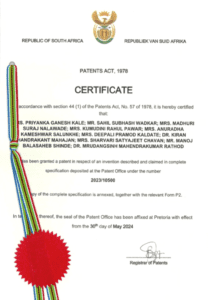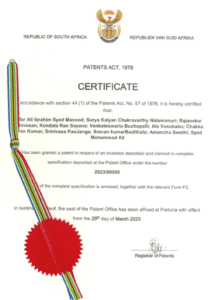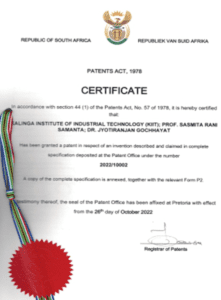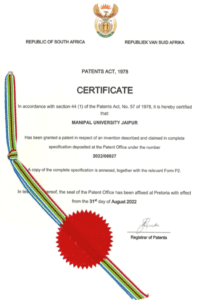How to Prepare for Patent Agent Exam?
Understanding the Patent Agent Examination
What is the Patent Agent Examination?
Patent Agent Examination is an important certification exam conducted by patent offices to assess the knowledge of individuals who wish to be registered as patent agents It examines a candidate’s knowledge of patent laws, procedures and technology as it is necessary to write and file a patent application.
The patent agent test should be administered to whom?
Those with a solid background in science, engineering, or engineering who want to focus on intellectual property law—specifically, patent filing and procedures—will find this exam appropriate. Engineers, scientists, law grads, and certified professions are among the applicants.
Benefits of registering as a licensee
A successful career in intellectual property law can be attributed to a patent registrant. Offering specialized services including patent application preparation, patent search and management of the patent portfolio, it enables you to represent manufacturers and organizations before the patent office
Academic Requirements for Eligibility for the Patent Agent Examination
To be eligible, candidates typically need to have a degree in science, engineering, or technology from an approved university. Computer science, electronics, biology, physics, and chemistry degrees are the most relevant.
Requirements for Citizenship and Age
Applicants for patent agent positions must be citizens of the nation in which they are applying and be at least 21 years old. For comprehensive eligibility, consult the relevant country patent office’s specific criteria.
Experience in the workplace and technical background
Having a technical background or R&D experience can be very beneficial during the exam, especially in the practical areas of patent drafting, even though employment experience is not required.

Overview of Patent Law and Rules
Introduction to Patent Law
The exclusive right to utilize an invention belongs to its authors under a particular branch of intellectual property law called patent law. This section covers the basics, such as what qualifies an invention for patent protection, the rights of patentees, and how to get a patent.
Understanding the Rules and Procedures for Patents
Understanding the rules governing the filing, evaluation, and prosecution of patent applications is essential. This includes timelines, forms, and specific procedural requirements outlined in the standards of the patent office.
Important Provisions of the 1970 Patent Act
Both the written and viva-voce portions of the test require a solid grasp of the Patents Act, especially the parts pertaining to patentable subject matter, grounds for opposition, and patent infringements.
Exam Structure and Pattern
The patent agent examination is a critical step for anyone looking to become a registered patent agent. It’s a challenging and competitive landscape that tests your understanding of patent law, procedures, and the patent application process.
Understanding the pattern of examination would allow you to plan before your test. Normally, patent agent examination consists of two categories: the written examination and the viva voce. In a written examination, it examines knowledge pertaining to patent act, rules, and procedures, applying a multiple-choice format and questionnaires of short answers coupled with case studies on actual application.
On the other hand, the viva voce test assesses your ability to apply patent laws in practical terms. You may be tested on the analysis of patent applications, questions relating to patentability (relatable to various sections) and even discussing your approach to patent-related issues.
Paper I (Two Hours) –Patent Act and Rules-100 marks, (Nature: Objective type; Multiple Choice Questions)
Paper II (Three Hours) –Drafting and interpretation of Patent specification and other documents (Nature: Descriptive and Viva-Voce) – 100 marks
To prepare for the examination effectively, the first step is to review the syllabus provided by the examination authority completely. The syllabus mainly consists of fundamental areas such as the nature of patent act and rules, different kind of patents, design, and, patentability criteria such as novelty, non-obviousness, complete patent application procedure, infringement, and enforcement of patent rights. Knowledge of each of these is essential, as questions in the examination can come from any of these areas.
Having appropriate study materials is necessary to prepare well. A range of resources is also to be considered: there are comprehensive textbooks Buy a copy of Indian bare act 1970. One can also refer or considers guidelines and manuals issued by the patent office: Manual of Indian patent. A very effective strategy would be the analysis of past examination papers for understanding the exam pattern and frequently tested topics.
A structured study plan is a must to cover the large syllabus in time. Define daily, weekly, and monthly objectives from the syllabus and allocate a set of hours every day for studying different subjects and subject areas, ensuring you allocate more time to difficult ones. Revisions, of course, should form a part of your schedule in order to reinforce what is understood and retained well at the last moment as you approach the exam date.
Discussions related to complex topics can enhance much better through collaboration, making study groups an integral component of your preparation strategy. Joining or forming a study group will enable discussion of difficult concepts, distribution of resources, and participating in mock discussions that shall prepare you for the viva voce.
Now, the importance of practice simply cannot be stated for proper preparation of patent agent exams. Mock tests would do the same and can expose you to a kind of realistic examination environment which could in turn help manage time accurately and improve over other defects. You will have some practice in writing claims in patents and preparing patent applications, which, indeed comes in handy especially when practicing for the written exam of the patent agent exam. You can do oral mock exams with your peers and mentors during the viva voce so that you become comfortable with the presentation of knowledge and also defending viewpoints that you hold.
During preparation, specifically, pay special attention to key concepts that recur consistently in the exam. Ensure that you spend extra hours understanding patentability criteria comprising novelty, non-obviousness, and industrial applicability that form the backbone. Familiarize yourself with the concept of prior art and its impact on patentability, draft and analyze patent claims that are at the heart of patent applications. Finally, learn about all kinds of patent infringement and defenses.
Since patent law is dynamic, you should keep updating your knowledge for your exam preparation. You will read newsletters, blogs, and journals on intellectual property law. Keeping yourself updated on recent case laws and patent statutes amendments will give you a glimpse into the kind of questions you may get during the exam, which will keep you prepared in advance for changes in the legal scenario.
Preparing for the patent agent examination requires a lot of care for your body and mind. Proper diet, exercise, and sleep will help keep you fit, in both body and mind, which keeps your mind sharp and focused. You should try practicing meditation or yoga; this will help to reduce stress levels and keep you more concentrated while studying during busy hours.
Preparation during this time is the most vital ingredient for success as you prepare to face the exams. Be clear about logistics on examination day, such as venue, time, and anything needed, including an identity card and stationery. A plan of your day will help you to be there in the examination venue on time and well-prepared to sit for the exams. On the day of examination, be easy-going and have a presence of mind.
























